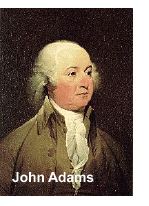
News
Behind the Headlines
Two-Cents Worth
Video of the Week
News Blurbs
Articles
Testimony
Bible Questions
Internet Articles (2015)
Internet Articles (2014)
Internet
Articles (2013)
Internet Articles (2012)
Internet Articles (2011)
Internet Articles (2010)
Internet Articles
(2009)
Internet Articles (2008)
Internet Articles (2007)
Internet Articles (2006)
Internet Articles (2005)
Internet Articles (2004)
Internet Articles (2003)
Internet Articles (2002)
Internet Articles (2001)


 hen
George W. Bush was fighting hard for 36 days in the State of Florida
to preserve his narrow 538 vote lead—and the 25 electoral votes
that would make him the 43rd President—his support from conservative
America was as fierce as is the growing opposition from the right today. The President is clueless why 3 million or
more votes that he needs to get re-elected may sit out the Election
of 2004 and allow John Forbes Kerry (if he prevails at the Democratic
National Convention) to become the 44th President of the United States
on November 2, 2004. Tragically, if that happens the U.S.
Sena
hen
George W. Bush was fighting hard for 36 days in the State of Florida
to preserve his narrow 538 vote lead—and the 25 electoral votes
that would make him the 43rd President—his support from conservative
America was as fierce as is the growing opposition from the right today. The President is clueless why 3 million or
more votes that he needs to get re-elected may sit out the Election
of 2004 and allow John Forbes Kerry (if he prevails at the Democratic
National Convention) to become the 44th President of the United States
on November 2, 2004. Tragically, if that happens the U.S.
Sena te--and
control of the ideology of the federal courts—will shift much
farther to the left when the U.S. Senate falls back into the hands of
the Democrats. If that happens, the House of Representatives will likely
revert back to Democratic control in 2006. If the Senate is recaptured
by the Democrats, the rule of law in America will die as our judicial
system becomes an ironclad instrument for implementing social justice
that makes victims out of criminals and criminals out of innocent American
citizens.
te--and
control of the ideology of the federal courts—will shift much
farther to the left when the U.S. Senate falls back into the hands of
the Democrats. If that happens, the House of Representatives will likely
revert back to Democratic control in 2006. If the Senate is recaptured
by the Democrats, the rule of law in America will die as our judicial
system becomes an ironclad instrument for implementing social justice
that makes victims out of criminals and criminals out of innocent American
citizens.
To understand why conservative America has lost faith in George W. Bush it is necessary to peel back the layers of our history to 1802 and look at the reason why colonial America lost faith in John Adams and the Federalist Party--the party of George Washington. As the 18th century came to a close, the fledgling American Republic found itself close to war with its ally, France.
In 1795, a year before Washington left
office, Thomas Pinckney negotiated a treaty with England (Jay's Treaty)
to settle border disputes, and another with Spain (The Treaty of
San Lorenzo) that gave the United States access to the Mississippi
through New Orleans. The French believed that Jay's Treaty implied
that America was once again becoming pro-British. France attempted to
extort a cash settlement from the United States for its assistance in
the Revolutionary War (known as the XYZ Affair). As a result,
hostilities flared. Shortly after John Adams was inaugurated as the
nation's  2nd
president, pitched battles between the American and French fleets commenced
on the high seas. In 1798 Adams pushed Congress to enact several repressive
measures against American citizens of French extraction. One of them
was The Naturalization Act. Under that law, French immigrants
had to wait 14 years (rather than 7 years) before they could apply for
American citizenship. Another new law made it a crime to ridicule or
otherwise hold the President of the United States in contempt or disrepute
by criticizing his decisions. Because the repressive measures violated
the Bill of Rights, Adams was viewed by most Americans with growing
trepidation. Many of those colonial Americans had fought and shed their
blood for the liberty they so fervently cherished. Most families in
America lost loved ones in the Revolutionary War, so the Constitution
and the Bill of Rights had a special significance to them (unlike Americans
today who desecrate their flag and disrespect the symbolism of the Stars
and Stripes under the guise of freedom as they destroy the republican
form of government their ancestors died to secure).
2nd
president, pitched battles between the American and French fleets commenced
on the high seas. In 1798 Adams pushed Congress to enact several repressive
measures against American citizens of French extraction. One of them
was The Naturalization Act. Under that law, French immigrants
had to wait 14 years (rather than 7 years) before they could apply for
American citizenship. Another new law made it a crime to ridicule or
otherwise hold the President of the United States in contempt or disrepute
by criticizing his decisions. Because the repressive measures violated
the Bill of Rights, Adams was viewed by most Americans with growing
trepidation. Many of those colonial Americans had fought and shed their
blood for the liberty they so fervently cherished. Most families in
America lost loved ones in the Revolutionary War, so the Constitution
and the Bill of Rights had a special significance to them (unlike Americans
today who desecrate their flag and disrespect the symbolism of the Stars
and Stripes under the guise of freedom as they destroy the republican
form of government their ancestors died to secure).
John Adams believed that French radicalism would fracture the nation causing a second revolutionary war—only this time, with the French. Congress passed the Aliens and Sedition Act of 1798 to stifle criticism of the presidency because of the other repressive measures that had already been enacted. Anyone who had ever read the Constitution knew that the laws being enacted by the Adams Administration were unconstitutional. As men who had fought the British to win liberty—and the right to free speech—were arrested, those who were afraid to speak out nevertheless saw, firsthand, that despots can be American as well as British.
The first victim of the Aliens and Sedition Act was Matthew Lyon of Vermont. Lyon's "crime" was a statement made in a letter published in a Vermont newspaper. Lyon said that with the federal executive "...every consideration of the public welfare is swallowed up in a continual grasp for power, and unbound thirst for ridiculous pomp, foolish adulation, and self avarice." Lyon was arrested and brought before Supreme Court Justice Patterson where he was found guilty of sedition. He was sentenced to four months in prison and fined $1,000. His property was auctioned off to pay his fine. Not only was Lyon found guilty of sedition, so was the newspaper publisher who printed his article. (So much for the 1st Amendment and freedom of the press.) Liberty lasted eleven years before the federal government violated the Constitution.
Thomas Cooper was the second man convicted of violating the Alien and Sedition Act. His "crime" was speaking out in defense of another man, Jonathan Robbins, who was also accused of violating the law. Cooper declared the law to be "...without precedent, without law and against mercy." Cooper received no mercy. He was also sentenced to four months, and his home, lands and property were seized to satisfy the $1,000 fine.
When the fourth lawbreaker, James T. Callender was hauled into the Supreme Court and faced Justice Chase, his lawyers raised the question of the legality of the law, which obviously violated the Bill of Rights. Chase refused to listen to their legal argument and threw out the briefs they had filed with the court, chastising the lawyers for bringing such a pathetic argument into court. They left the courthouse in disgust, leaving their client to the mercy of Chase. Chase showed none. Four months and $1,000.
A highly respected New York jurist, Judge Jared Peck distributed a petition to force Congress to readdress such an unconstitutional law. He collected hundreds of signatures. As he was collecting his signatures, a secret grand jury in New York indicted him for sedition. A bench warrant was issued for his arrest. Police officers came to his home during a family gathering and arrested him like a common criminal. That was a mistake for the Adams Administration. Peck was one of the most respected jurists in America. The spectacle of his arrest raised the hackle of every American and the mediadecided to fight back. It was because of the arrest and conviction of Peck that the Kentucky and Virginia Resolves were written, crushing for over 100 years the attempts of the federal government to subjugate the citizens of the United States with laws that violate the Constitution and the Bill of Rights. (Excerpts [above] from the soon-to-be-published Destiny Denied by Jon Christian Ryter.)
More important, the Kentucky and Virginia Resolves took the federal government to task. James Madison, who authored the Virginia Resolve reminded the central government the States had surrendered only a portion of their power to the federal government and that, whenever the federal government usurped its authority, the States would interfere and take that power back. The Kentucky Resolve went a step farther and said that the States retained the power to nullify any federal law; and that the Resolves did, in fact, when delivered to the Congress, nullify the Aliens and Sedition Act. When Jefferson was elected, he released from prison all those still incarcerated for violations of the Aliens and Sedition Act. Because of the legal precedent created by the Kentucky and Virginia Resolves, the States may enact a Resolve to nullify any federal law they feel exceeds the authority they gave the federal government. In fact, when South Carolina threatened to write a Resolve to dissolve the Union in 1858, the Administration of President Franklin Pierce threatened to send federal troops into South Carolina if they submitted such a document to Congress. It appears that the federal government believed in the power of a State Resolve.
The impact of the Aliens and Sedition Act on the American people was earth-shattering. Adams lost his bid for re-election in 1800. Thomas Jefferson, who served as Adam's vice president, ran as a States-right Democratic-Republican. After 1802, no Federalist candidate would ever be elected. The Aliens and Sedition Act became a stigma that destroyed that political party. In 1804 Thomas Pinckney ran as a Federalist against Jefferson and received 14 electoral votes to Jefferson's 162. The last candidate to run as a Federalist was Rufus King who ran against James Monroe. King took 34 electoral votes against 183 for Monroe. When John Quincy Adams (the son of the second president) ran against Monroe four years later, Adams took only one electoral vote and lost in the biggest landslide in the history of American politics. Those who shed their blood that their children could live in freedom and without fear of their government discovered that politicians cannot be trusted. And, as they did in 1800, Americans learned early (although of late we've forgotten) that, when the rascals attempt to steal liberty from the people, it is time to not only turn them out of office, but to erase their political parties from existence.
Even though he was a Federalist, Adams ran in 1820 as an Independent. But, he didn't fool anyone. Adams was a Federalist from birth, and everyone knew it. John Quincy Adams, like his father, was doomed to be a one-term president. (It is important to remember that the people of the United States did not elect Adams in 1824 when he became president. Congress elected him. The people wanted States-right war hero Andy Jackson.} With four major candidates running in 1824, Jackson pulled 99 electoral votes--about a dozen votes short for victory. The election was thrown into the House of Representatives where Henry Clay, who pulled the least amount of the popular vote—threw his support behind Adams on the promise that Adams would name him Secretary of State. Jackson won the popular vote of 11 states, but only seven cast their votes for him in the House vote.) Hopefully, our current president, George W. Bush is taking a primer on history right now. If he isn't, the Bush family will repeat the history of the Adams family. The Federalist Party died because its caretakers chose to ignore the Constitution of the United States and enact laws that violated the Bill of Rights and made the citizens of the United States enemies of its government. Which brings us to the present
In 1995, in the aftermath of the terrorist
act that brought down the Alfred P. Murrah Building in Oklahoma
City, Congress enacted the Comprehensive Anti-Terrorist Act of 1995.
Within days of the tragedy, anti-terrorist legislation, S.735, zipped
through the U.S. Senate at breakneck speed—without any public scrutiny
to what was in the bill. The 187 victims of the Murrah tragedy had barely
been laid to rest when its companion bill, HR 666 was headed for a floor
vote in the House of Representatives. The New York Times and Washington Post trumpeted the Comprehensive Anti-Terrorist
Act as a necessary evil that would provide Americans with an added
measure of security against both domestic and foreign terrorists. When
the public  learned
what was in HR 666, the bill was scuttled. On March 7, 1996 HR 2703
would be the bill that passed. The Bill of Rights abrogations were gone.
learned
what was in HR 666, the bill was scuttled. On March 7, 1996 HR 2703
would be the bill that passed. The Bill of Rights abrogations were gone.
In the fall of 1995, GOP campaign strategist Dick Morris (who had been hired by Clinton to outthink the Republicans) Morris began conducting a series of surveys to determine the likelihood of Clinton being re-elected. With the passage of the Comprehensive Anti-Terrorist Act Clinton's popularity with everyone except the agendized far left nosedived. Morris called Clinton a day or so before Christmas in 1995 and told the president if the 1996 election had been held that day, Clinton would have lost to Senate Majority Leader Bob Dole (the presumptive nominee) by at least 16%. The American people no longer trusted their president. (Of course, the conservatives didn't ever trust the Clintons, but those were not the people Morris had been polling. Morris was polling the Democratic factory worker swing votes in the political center who actually determine who gets elected.) The card-carrying union factory worker no longer trusted Clinton because he was trying to violate their liberty. Had HR 666 been enacted, Bill Clinton would have been a one term president just like John Adams who violated the Bill of Rights with the Aliens and Sedition Act.
HR 666, had it passed in the House, would have legislatively abrogated freedom of religion, freedom of speech, the right to petition and, under extraneous circumstances, freedom of the press. It would have eliminated the right of American citizens to own or possess firearms. The Posse Comitatus Act would have been eliminated as the American government would have been allowed to use military troops to assist local police (something this government, for good reason, has not been allowed to do since the Civil War when soldiers arrested suspected seditionists and denied them due process under the Bill of Rights). The right from unreasonable search—and seizure—would be eliminated. Gone would have been right of habeus corpus. Also gone would have been the 5th Amendment guarantees of due process and the 6th Amendment right to face your accuser. Authorities would have the right to hold you without charges, or without trial, as long as they wanted to. And, finally, the 10th Amendment would be legislatively abolished, giving the federal government total dictatorial power over every aspect of life in America during times of national emergency.
When the American people discovered what totalitarian "safeguards" awaited them in HR 666, there was an outcry heard around the world. An uncommon alliance was formed between the far left and the far right that conjoined the American Civil Liberties Union and the American Conservative Union like Siamese twins to fight what each viewed as a common evil. That union is still firmly yoked as the left and right now fight Attorney General John Ashcroft's USA Patriot Act that President Bush unwisely mentioned in his latest campaign TV spot as though it was a piece of legislation of which the American approve.
Since the passage of the USA Patriot Act in October, 2001, Bush's popularity has continued to erode. The nationalistic far right, which generally backs neo-conservatives like Pat Buchanan (or folk heroes like Judge Roy Moore) sees Bush and his 9th cousin-twice-removed, John F. Kerry, as two peas in the same pod—secret members of Skull & Bones who are trying to crush resistance to the New World Order by vacating the Bill of Rights in order to stifle dissent. As you move closer to the centrist constitutional right, there is a growing apprehension that President Bush crossed the line when he signed the Patriot Act into law, unconstitutionally infringing on the Bill of Rights. Conservative constitutional activists are frightened by Bush because of Attorney General John Ashcroft's disregard for the Bill of the Rights. An American citizen who is, admittedly, an Al Qaeda-trained Islamic terrorIst, Jose Padilla has been held without charges for over two years. Padilla is believed to have been trying to create a radiological dirty bomb that he planned to explode in a populated area like San Francisco or Los Angeles. Even though that is thre reason the Justice Department ordered his arrest and detention, he has never been charged. Several natural and naturalized citizens, who should be protected by the umbrella of the Bill of Rights, have been arrested and detained without regard for their rights.
There is growing fear among civil rights activists on both the right and the left that the USA Patriot Act could, and would, be used to stifle constitutional free speech in a variety of ways even if the federal government did not apply it. It is a tool local law enforcement officers will be hard pressed to resist since seldom do local issues end up on dockets of the State or U.S. Supreme Court. While the federal government will likely use the unconstitutional aspects of the USA Patriot Act sparingly to minimize the risk of it being overturned by a federal court, it is more often the fear of what our politicians are up to and not necessarily the reality that generates distrust. Since American citizens with suspected ties to al Qaeda have—since 9-11-01—been surreptitiously arrested and incarcerated without due process, Americans know the possibility exists that any dissident, for any reason, can be arrested and denied their rights to due process. It was this same fear, in 1804, that made John Adams a one-term president. And it was that same fear that made being a Federalist akin to being a leper.
Will the USA Patriot Act end the presidency of George W. Bush? Will the USA Patriot Act bring about the demise of the Republican Party? Stay tuned. The conclusion of this drama is only eight months away.

Copyright © 2009 Jon Christian Ryter.
All rights reserved.


